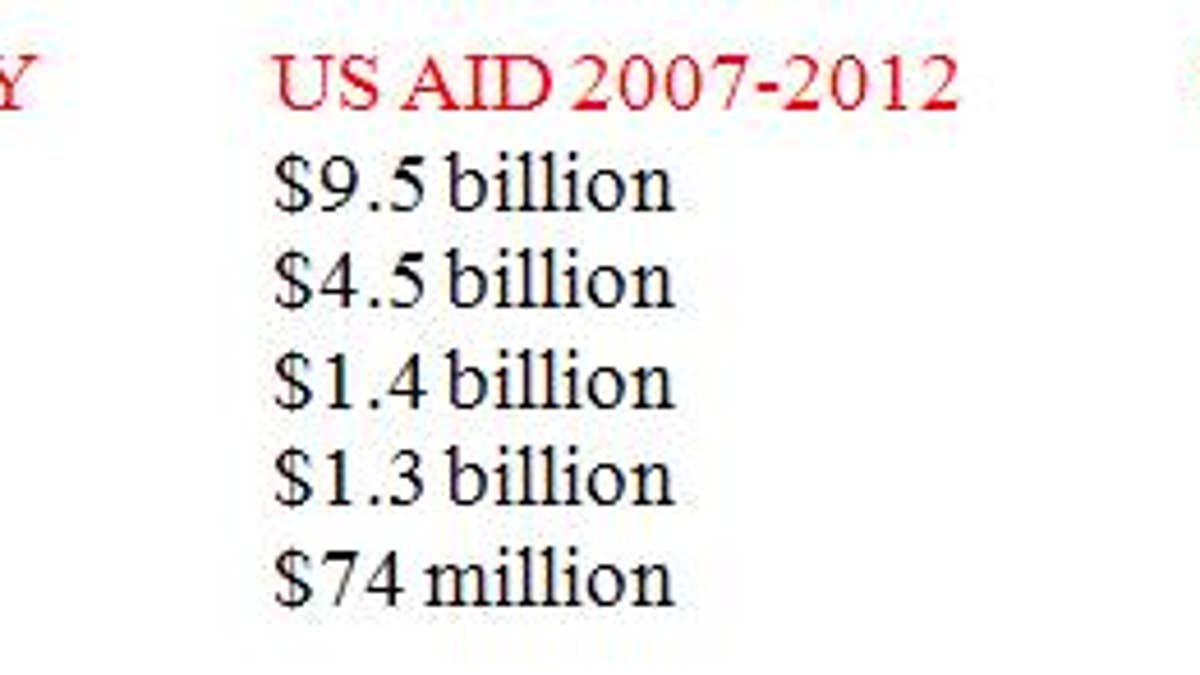
While America's standing in the Middle East couldn't get much lower, you wouldn't know it looking at the U.S. foreign aid budget. Of proposed U.S. assistance for 2012, almost two-thirds is earmarked for Muslim nations and one-third goes to Arab countries.
Yet, despite those billions in aid, opinion polls show most Arab citizens still have an unfavorable view of America and most Muslim nations routinely vote against U.S. interests in the United Nations.
"If we are giving money to countries consistently voting against our interest, we ought to cut them off," says Congressman Steve Chabot (R-OH) who sits on the House Foreign Affairs Committee. "But Congress is going to need to get some backbone here because it consistently gives Presidents the ability to waive the cutoff of that money."
Years ago, U.N. Ambassador John Bolton proposed cutting off all aid to the 30 nations who consistently voted against the U.S. in the UN. Before him, President Reagan's U.N. Ambassador Jeane Kirkpatrick proposed cutting off $1 million in aid for each vote an aid recipient cast against the U.S. in the U.N. In both cases, Bolton says the State Department overruled them.
"Foreign aid to a lot of countries could be readily cut and I think it's been a mistake by the U.S. government for decades not to take U.N. voting into account," Bolton said Monday.
This document, released by the State Department, examines 13 critical votes in the UN in 2010.
Compare that to this list of US aid recipients for 2012 and this poll released last week by the Pew Research Center Global Attitudes Project.
The result: some of the largest recipients of U.S. taxpayer money over the last 6 budget years consistently vote against the U.S. and harbor negative or unfavorable views of America.
Some other Muslim countries show almost no friendship or allegiance to the U.S. but continue to see the State Department shower them with money.
Algeria has received $60 million and votes with the U.S. just 16% of the time. Oman $74 million, 18% voting coincidence. Whereas the Palestinian Territories received $3 billion dollars yet just 18% have a favorable view of the U.S.
"The U.S. has to quit being kicked around. We need to quit sending our tax dollars to countries that do not have our best interests in mind, especially in these economic times," says Chabot.
Instead, if you look at U.S. aid over time, it's largely on auto-pilot. Once a nation is on the U.S. gravy train, few are ever cut off, regardless of their loyalty, gratitude or actions.
This link allows you to see who gets aid and where it goes.
In our analysis of the numbers, of the President's 2011 foreign assistance request of $34.5 billion, 60% or $20.1 billion goes to Muslim nations, or those where a majority practice Islam. About 33% or the total budget, or $11.6 billion is awarded to Arab countries.
(((Click here to use the Taxpayer Calculator)))
And while many Americans think most U.S. foreign aid goes to "humanitarian assistance" or food and medicine for the poor, an analysis shows 80% of our aid to Arab countries pays for police and the military. And despite the President's speech last week calling for closer ties with Middle Eastern nations and fostering free market, democratic principles, just 5% of our aid to the region is dedicated to 'economic development'.
While some suggest our support for repressive, autocratic regimes explains America's poor poll numbers, and should be discontinued, Bolton has a different view.
While conceding a reform of U.S. foreign aid is "way overdue" he says, "I don't think the opinions you see in foreign countries should govern where the aid goes. It should be based on what is in our interest not what is in their interest."












































